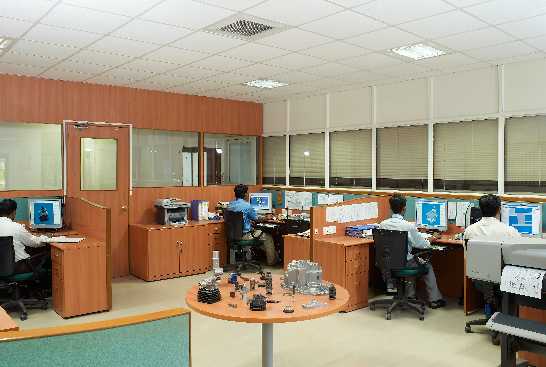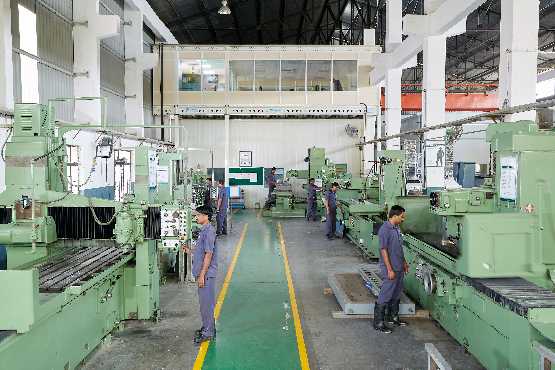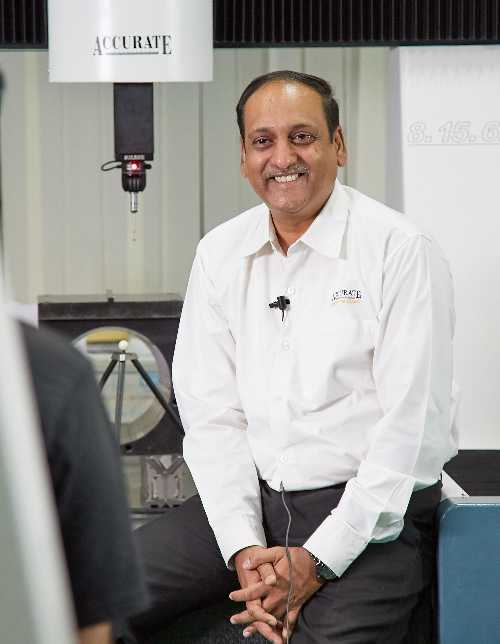Founded by Late Vilasrao Salunkhe in the early sixties; Accurate Gauging and Instruments has been a pioneer in the industrial metrology solutions for various industries for over six decades. Its the first Indian company in the private sector to manufacture plug gauges. Vikram Vilasrao Salunkhe the second-generation entrepreneur and Managing Director of Accurate Gauging and Instruments believe that Indian metrology solutions have an edge over Chinese products in terms of quality and potential in the global market.
Many Indian companies laid the foundation of ‘Make in India’ in their motto and practice decades before this flagship programme of the Government became a ubiquitous appeal to woo manufacturers worldwide. At the time when tariff rates and import duties were way too high to have allowed Indian industries to avail foreign solutions, some Indian companies stepped in to develop indigenous solutions for Indian industries.
 Accurate Gauging & Instruments Private Limited is one such shining name in the glory of Indian manufacturing. The company is a pioneer in industrial metrology since its inception in 1963. Based in Pune, the company has been serving various segments such as engineering, automobile, aerospace, railways, energy, oil and gas, medical engineering, government sector, and technical education.
Accurate Gauging & Instruments Private Limited is one such shining name in the glory of Indian manufacturing. The company is a pioneer in industrial metrology since its inception in 1963. Based in Pune, the company has been serving various segments such as engineering, automobile, aerospace, railways, energy, oil and gas, medical engineering, government sector, and technical education.
Covering inspection, calibration and offline programming, Accurate Gauging’s conviction to the cause of quality has remained the cornerstone for performance. Speaking to Machine Maker, Managing Director at Accurate Gauging, Vikram Salunkhe spoke at length about the company’s journey and the various aspects of industrial metrology.
From Contract Manufacturing to Gauging
Vikram recollects his father Late Vilasrao Salunkhe who passed out from the College of Engineering Pune and always wanted to be an entrepreneur. “As an idea of starting a venture, he thought of machining automotive parts. It so happened that the first customers asked him to manufacture close tolerance parts requiring measurements. So, my father set up the entire process by installing lathe machines. For testing the parts plug gauges were required, so he began to look for companies who would provide plug gauges. Owing to long times to procure them from these companies, my father realized he had to manufacture them for his business success.” Thus, Accurate Gauging came into being as the first private sector company to manufacture plug gauges.
 Gradually, Accurate Gauging expanded its operation by producing snap gauges, air gauging instruments and callipers. During the early sixties many well-known manufacturers thereafter, companies were established and as a result that the entire metrology ecosystem developed out of Pune. Accurate Gauging’s first customer was Kirloskar Oil Engines, and it still remains so as a legacy client. “For all of our subsequent products including the present 3D Coordinate Machines, Kirloskar Oil Engines has been one of our valued customers.”
Gradually, Accurate Gauging expanded its operation by producing snap gauges, air gauging instruments and callipers. During the early sixties many well-known manufacturers thereafter, companies were established and as a result that the entire metrology ecosystem developed out of Pune. Accurate Gauging’s first customer was Kirloskar Oil Engines, and it still remains so as a legacy client. “For all of our subsequent products including the present 3D Coordinate Machines, Kirloskar Oil Engines has been one of our valued customers.”
Vikram Salunkhe joined Accurate Gauging in 1988 primarily in the sales and marketing team. “By that time we had already started the development of 3D Coordinate Machines, and I focused on CMM as a product line for the company.
Innovation comes with a Cost!
During the initial years, the tariff rates for components, sensors, scales etc. were very high and the import duties were in the range of eighty per cent. The domestic market was also very limited with only a few automakers in the industry. That was the era before liberalization. Mr Salunkhe points out that post-1991, as new economic policies were announced by the government, there was a significant decrease in import duties which meant the competition from the global market became far more intense. Today, any product from any part of the world is available in the Indian market. Hence it is almost obligatory that every product made in India meet the global standard, if not of better quality and is made available in the Indian market.
It is a general notion that Indian products are cheap; the truth about this is arguable. Vikram Salunkhe explains, “For every product, there is a development cycle, and during the initial stage the cost is significantly high given the raw materials being expensive and the time is taken for development is a bit longer. For the Indian manufacturers, a lot of things need to be developed on their own, due to the absence of a systematized ecosystem. On the other hand, the Indian market does not have requirements in terms of volume. So, the end product is typically on a higher price side. We have to ensure that our products are of good quality and better service yet offered at a slightly lesser price only then customers will consider Indian products for their applications in the global market. The expectation that Indian product will be significantly cheap during the initial developmental phase is a bit challenging.”

Talking of global customers’ attitude to Indian product, Vikram Salunkhe says that there is a very high market value for Accurate Gauging products, specifically the Coordinate Measuring Machines (CMMs). The machines are delivered with a lot of added advantages and features and are mechanically far superior to many of the mass-produced products. The global customers acknowledge the value for such high-end precision products from India as compared to any other products available globally. “There is a definite inclination for Indian products due to their uncompromised quality and durability. The Chinese products may be price-wise very competitive but when it comes to material and standards many Indian machine tool companies have an advantage.”
Many companies have realized better margins can be gained by selling products outside India. Mr Salunkhe says, “This is so in two aspects. Firstly, In India, the time taken for decision making and finalizing a product purchase is much longer, be it in the public or private sector. Whereas for the overseas market, the process of purchase is much faster. The second aspect is that the pricing pressure on the export is much less than the domestic market.”
Collaborative efforts hold the key to future developments. “Earlier there was a time gap between need and the deployment of products in the western countries and India. Now we are working on products which will be deployed simultaneously in our country and the west. And such kind of approach requires that the best brains across the world work together,” concludes Mr Salunkhe.



